As we go into the new school year, I just want to take a few minutes and welcome folks back, and to welcome those that might be new to teaching civics here in Florida. This post will share with you some of the resources that are available for teaching civics in this state. Some of these might help those of you teaching civics and social studies in other states as well. An overview of some excellent primary sources for social studies and civics education is also available! Certainly, this is only a very small list; throughout the year, we will continue sharing new resources, spotlighting excellent resources, and discussing ways in which they may be used in your classroom.
The Florida Joint Center for Citizenship
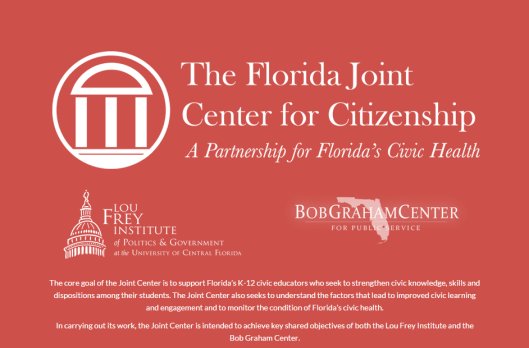 For obvious reasons, we start with the Florida Joint Center for Citizenship. As an organization, the FJCC offers free resources and professional development to teachers, schools, and districts, centered around civic education. Most recently, we worked in collaboration with Miami-Dade county teachers to create elementary civics lessons (‘Civics in a Snap’), which will be shared with you as soon as our NEW site goes live later this week! Our most accessed resource, the 7th grade Applied Civics Resources, provides lesson plans, content background videos, benchmark specifications, and assessment items that teachers can use to teach the benchmarks. Please note that in order to access most resources on the site, a free registration is required.
For obvious reasons, we start with the Florida Joint Center for Citizenship. As an organization, the FJCC offers free resources and professional development to teachers, schools, and districts, centered around civic education. Most recently, we worked in collaboration with Miami-Dade county teachers to create elementary civics lessons (‘Civics in a Snap’), which will be shared with you as soon as our NEW site goes live later this week! Our most accessed resource, the 7th grade Applied Civics Resources, provides lesson plans, content background videos, benchmark specifications, and assessment items that teachers can use to teach the benchmarks. Please note that in order to access most resources on the site, a free registration is required.
iCivics
 iCivics is perhaps one of the most well known and loved civics resources in the nation. The site provides games, writing tools such as Drafting Board, lesson plans, and other resources for teachers to better teach that next generation of citizens. The FJCC has worked closely with iCivics in developing resources aligned with the Florida Benchmarks, which we have integrated into our lesson plans, though their curriculum and resources are intended for a national audience. Free registration is required, but it is well with your time, and I have never known a teacher to say a negative word about iCivics. Just be sure that you make sure whatever resource you are using fits your state’s standards! Here in Florida, folks from the Florida Law Related Education Association lead the iCivics effort across the state, and are themselves worth a look.
iCivics is perhaps one of the most well known and loved civics resources in the nation. The site provides games, writing tools such as Drafting Board, lesson plans, and other resources for teachers to better teach that next generation of citizens. The FJCC has worked closely with iCivics in developing resources aligned with the Florida Benchmarks, which we have integrated into our lesson plans, though their curriculum and resources are intended for a national audience. Free registration is required, but it is well with your time, and I have never known a teacher to say a negative word about iCivics. Just be sure that you make sure whatever resource you are using fits your state’s standards! Here in Florida, folks from the Florida Law Related Education Association lead the iCivics effort across the state, and are themselves worth a look.
The Center for Civic Education
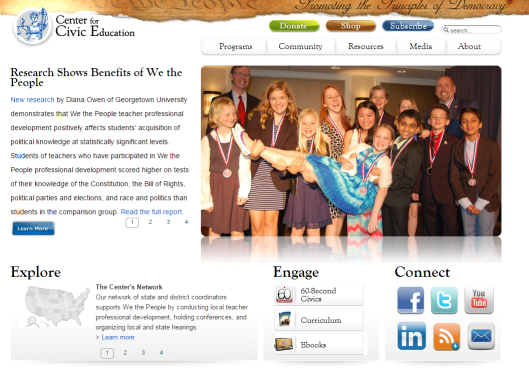 The Center for Civic Education is perhaps one of the most well known and important national civic education organizations. Their ‘We the People’ and ‘Project Citizen‘ materials are incredibly popular, and they do an excellent job in helping students understand the foundations of citizenship and to start them on the path toward civic engagement.
The Center for Civic Education is perhaps one of the most well known and important national civic education organizations. Their ‘We the People’ and ‘Project Citizen‘ materials are incredibly popular, and they do an excellent job in helping students understand the foundations of citizenship and to start them on the path toward civic engagement.
The United States Youth Senate Program
 The United States Youth Senate Program is a unique educational experience for outstanding high school students interested in pursuing careers in public service. The 54th annual program will be held in Washington, D.C., from March 5 – 12, 2016. Two student leaders from each state, the District of Columbia and the Department of Defense Education Activity will spend a week in Washington experiencing their national government in action. Student delegates will hear major policy addresses by Senators, cabinet members, officials from the Departments of State and Defense and directors of other federal agencies, as well as participate in a meeting with a Justice of the U.S. Supreme Court. All transportation, hotel and meal expenses will be provided by The Hearst Foundations. In addition, each delegate will also be awarded a $5,000 College Scholarship for undergraduate studies, with encouragement to pursue coursework in history and political science.To apply, please contact your state selection contact. Here in Florida, the contact is Annette Boyd-Pitts of FLREA.
The United States Youth Senate Program is a unique educational experience for outstanding high school students interested in pursuing careers in public service. The 54th annual program will be held in Washington, D.C., from March 5 – 12, 2016. Two student leaders from each state, the District of Columbia and the Department of Defense Education Activity will spend a week in Washington experiencing their national government in action. Student delegates will hear major policy addresses by Senators, cabinet members, officials from the Departments of State and Defense and directors of other federal agencies, as well as participate in a meeting with a Justice of the U.S. Supreme Court. All transportation, hotel and meal expenses will be provided by The Hearst Foundations. In addition, each delegate will also be awarded a $5,000 College Scholarship for undergraduate studies, with encouragement to pursue coursework in history and political science.To apply, please contact your state selection contact. Here in Florida, the contact is Annette Boyd-Pitts of FLREA.
The Ashbrook Center
 The Ashbrook Center is an excellent resource for both primary sources and teacher professional development. Perhaps more well known for the materials it provides through TeachingAmericanHistory.Org, Ashbrook has some nice resources for civic education as well, and their seminars on aspects of American government, civics, and history are excellent. I had the opportunity to attend one myself, and it was very well done, though reading-intensive. They are expanding more into Florida. Please keep an eye on this blog for information on upcoming seminar opportunities with Ashbrook.
The Ashbrook Center is an excellent resource for both primary sources and teacher professional development. Perhaps more well known for the materials it provides through TeachingAmericanHistory.Org, Ashbrook has some nice resources for civic education as well, and their seminars on aspects of American government, civics, and history are excellent. I had the opportunity to attend one myself, and it was very well done, though reading-intensive. They are expanding more into Florida. Please keep an eye on this blog for information on upcoming seminar opportunities with Ashbrook.
The Bill of Rights Institute
 Putting aside, for now at least, the somewhat controversial background of the Bill of Rights Institute , the resources provided by the BORI are worth taking a look at, especially the primary sources that are provided.
Putting aside, for now at least, the somewhat controversial background of the Bill of Rights Institute , the resources provided by the BORI are worth taking a look at, especially the primary sources that are provided.
The National Archives and the Library of Congress
 The National Archives and the Library of Congress have a wonderful collection of resources that any and every social studies and civics teacher should want to use. We have written about the new mobile app before, and the FJCC has worked closely with the National Archives in providing professional development to teachers at all levels of education.
The National Archives and the Library of Congress have a wonderful collection of resources that any and every social studies and civics teacher should want to use. We have written about the new mobile app before, and the FJCC has worked closely with the National Archives in providing professional development to teachers at all levels of education.
Mock Elections
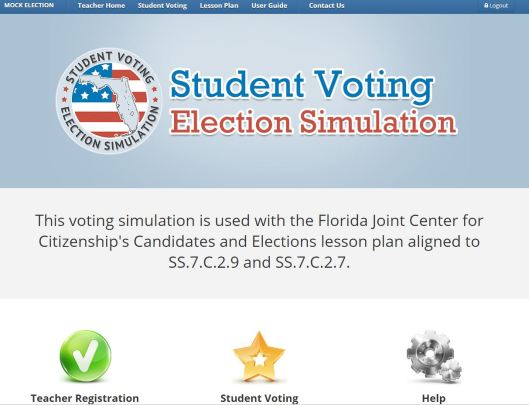
The FJCC/Lou Frey Institute Student Voting Election Simulation, while aligned with Florida’s Civic Benchmarks SS.7.C.2.9 and SS.7.C.2.7, can be used by anyone in any state as a way to have students engage in the process of voting. It is easy to use and pretty flexible in how you choose to use it. Registration IS required, but is as always free.
Civics Tutorials
 This Civics Tutorial site is aligned with the Florida Civics Benchmarks, and provides some excellent guided tutorial pieces for students to use within a flipped classroom model, as a remediation tool, or in preparation for 7th grade Civics EOC. An overview of the site can be found here.
This Civics Tutorial site is aligned with the Florida Civics Benchmarks, and provides some excellent guided tutorial pieces for students to use within a flipped classroom model, as a remediation tool, or in preparation for 7th grade Civics EOC. An overview of the site can be found here.
Escambia Civics Review Site
 The Escambia Civics Review site is just what the name implies: a review site intended to prepare students for success on Florida’s Civics EOCA. However, it contains additional resources that can be used throughout the year. These resources include vocabulary games, connections to Discovery Ed (if you have an account with that specific resource), assessment items, a practice test, and, most significantly, student friendly readings. These readings are about a page long and are intended to be used by teachers to supplement instruction in the benchmarks. They have been rewritten recently to ensure consistency in the vocabulary and that all of the readings are appropriate for middle school students!
The Escambia Civics Review site is just what the name implies: a review site intended to prepare students for success on Florida’s Civics EOCA. However, it contains additional resources that can be used throughout the year. These resources include vocabulary games, connections to Discovery Ed (if you have an account with that specific resource), assessment items, a practice test, and, most significantly, student friendly readings. These readings are about a page long and are intended to be used by teachers to supplement instruction in the benchmarks. They have been rewritten recently to ensure consistency in the vocabulary and that all of the readings are appropriate for middle school students!
The C3 Framework
 The C3 Framework is a relatively new resource provided by the National Council for the Social Studies (and you should be a member; talk about resources!). It’s Four Dimensions lend themselves well to civics, especially the focus on asking questions and taking action. An overview of the C3 can be found here, and I encourage you to check it out, even if your state is not using it.
The C3 Framework is a relatively new resource provided by the National Council for the Social Studies (and you should be a member; talk about resources!). It’s Four Dimensions lend themselves well to civics, especially the focus on asking questions and taking action. An overview of the C3 can be found here, and I encourage you to check it out, even if your state is not using it.
Florida Civic Health
 The Lou Frey Institute’s Florida Civic Health site allows you to compare Florida to every other state in a number of measures of civic health. While it is obviously using Florida as a starting point, you CAN use it to compare your own state to Florida, or to compare metropolitan areas within the state of Florida. Simply select your state on the map, as you see in the screenshot below.
The Lou Frey Institute’s Florida Civic Health site allows you to compare Florida to every other state in a number of measures of civic health. While it is obviously using Florida as a starting point, you CAN use it to compare your own state to Florida, or to compare metropolitan areas within the state of Florida. Simply select your state on the map, as you see in the screenshot below.

Countable
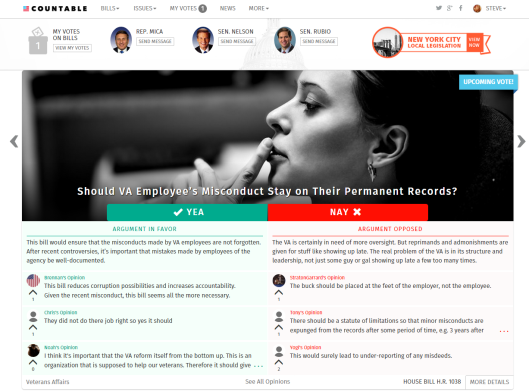 Countable is a FANTASTIC new resource for teachers in social studies, and especially civics. It would be an injustice to summarize it in just a few words, so please take a look at the post we did on it here, or simply visit it yourself to explore it! The current topic for discussion? Birthright citizenship. Check it out!
Countable is a FANTASTIC new resource for teachers in social studies, and especially civics. It would be an injustice to summarize it in just a few words, so please take a look at the post we did on it here, or simply visit it yourself to explore it! The current topic for discussion? Birthright citizenship. Check it out!
The Civil Debate Wall
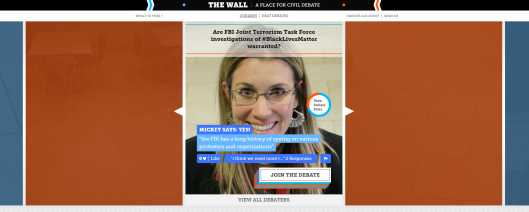 From the site: The Bob Graham Center’s Civil Debate Wall is a unique, innovative social media tool created by Local Projects for The Bob Graham Center for Public Service at the University of Florida and funded by a grant from the Knight Foundation. The Wall creates constructive dialogue by providing a physical social media tool that connects large touch screens, a texting system, and a website. These three synchronized components create a single, seamless interactive experience for the broader University of Florida community to actively engage in local, national and international issues. The website component of the Wall closely mirrors the physical Wall. The website attracts users who are not physically on campus. Providing the same features, the website gathers users from a broader population and allows users to keep track of debates.
From the site: The Bob Graham Center’s Civil Debate Wall is a unique, innovative social media tool created by Local Projects for The Bob Graham Center for Public Service at the University of Florida and funded by a grant from the Knight Foundation. The Wall creates constructive dialogue by providing a physical social media tool that connects large touch screens, a texting system, and a website. These three synchronized components create a single, seamless interactive experience for the broader University of Florida community to actively engage in local, national and international issues. The website component of the Wall closely mirrors the physical Wall. The website attracts users who are not physically on campus. Providing the same features, the website gathers users from a broader population and allows users to keep track of debates.
These are just a few of the resources that are available for civic education in Florida and across the nation. If you have additional ones, please feel free to share them with me at stephen.masyada@ucf.edu, or leave a comment on this post. Please do the same if you would like professional development or any other help or support! Don’t forget to take a look at the overview of primary resource tools here, and be sure to check out the Florida Civics Teacher’s Facebook Page and the Florida Joint Center for Citizenship Facebook Page! Good luck in the new year, and thank you for the work that you do!


 Karina Mullen Branson is a graphic recorder and facilitator based in Fort Collins, Colorado and founder of ConverSketch. Graphic recording is a method of visual note-taking; simply put, Karina listens to your group talk and distills key ideas from the conversation/meeting/presentation/etc. She uses hand-drawn images and text to make a large-scale map of your ideas in real-time so participants can see the conversation as it emerges and develops. Karina was a member of the graphic recording team at NCDD’s 2012 conference in Seattle. She has also worked locally and internationally with clients including the United Nations University, BASF, the City of Fort Collins, the National Park Service, Colorado State University, and the Center for Public Deliberation.
Karina Mullen Branson is a graphic recorder and facilitator based in Fort Collins, Colorado and founder of ConverSketch. Graphic recording is a method of visual note-taking; simply put, Karina listens to your group talk and distills key ideas from the conversation/meeting/presentation/etc. She uses hand-drawn images and text to make a large-scale map of your ideas in real-time so participants can see the conversation as it emerges and develops. Karina was a member of the graphic recording team at NCDD’s 2012 conference in Seattle. She has also worked locally and internationally with clients including the United Nations University, BASF, the City of Fort Collins, the National Park Service, Colorado State University, and the Center for Public Deliberation.



















